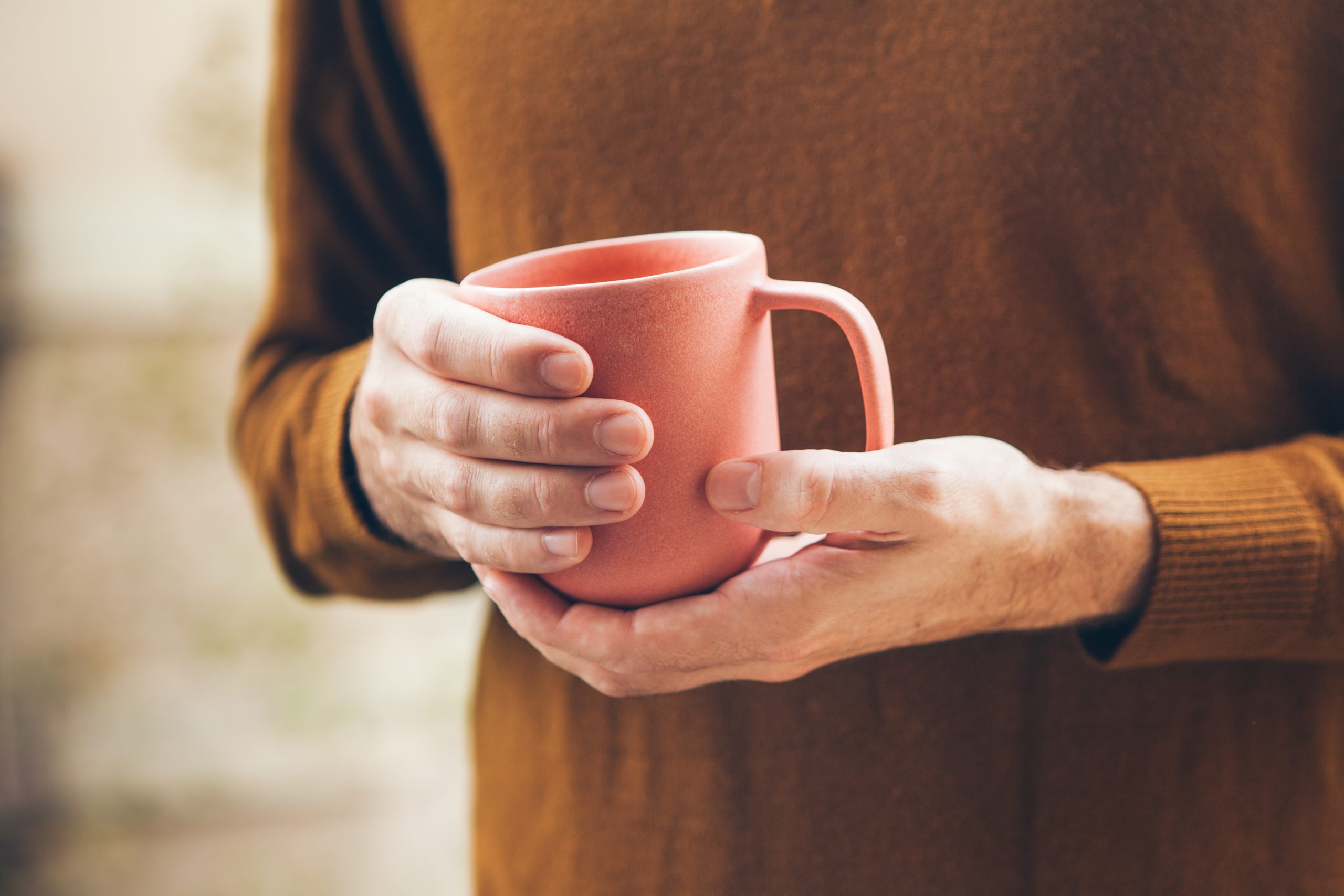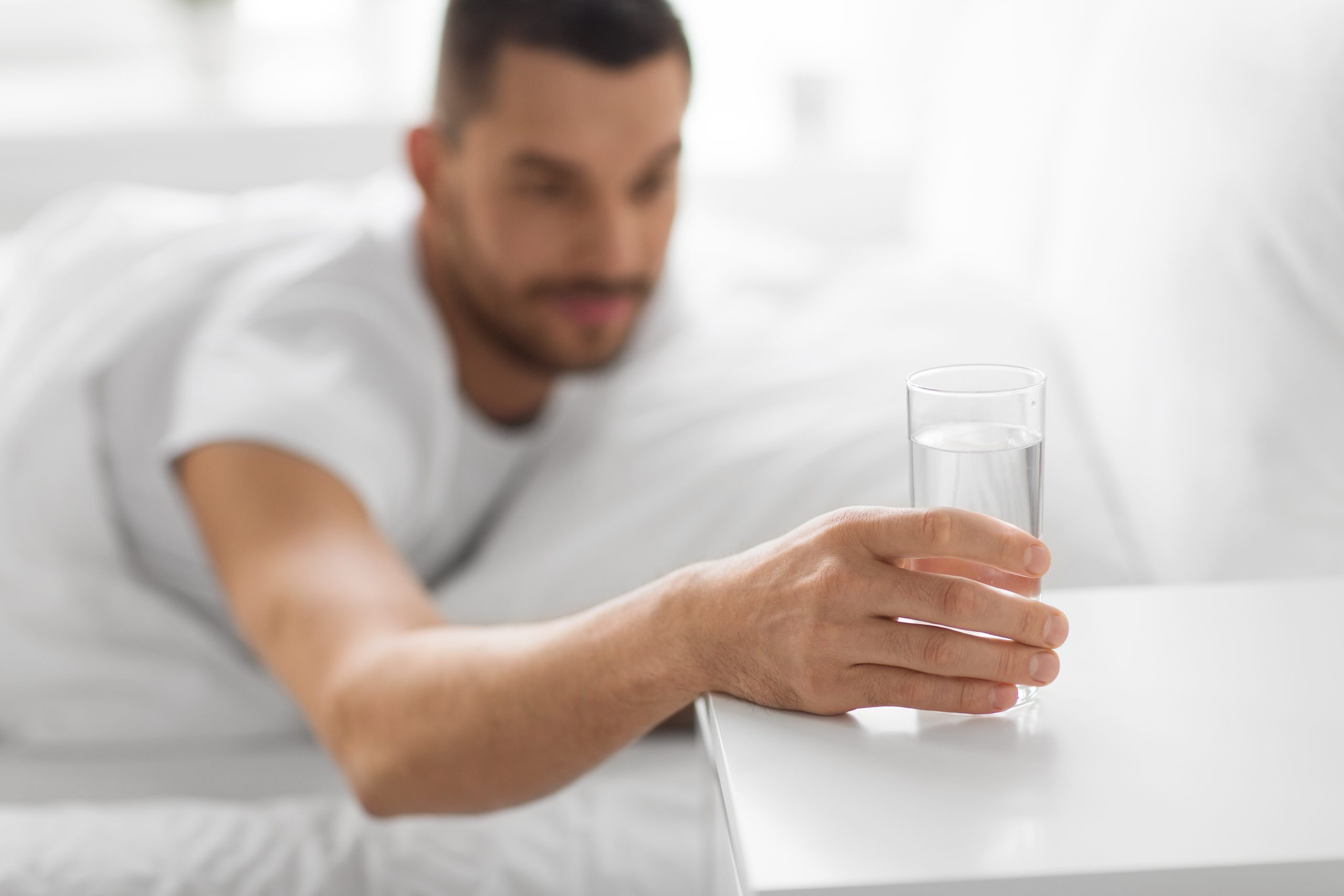Research from McGill University found that the brain’s biological clock makes us thirstier right before bed, and the researchers believe this is to prevent dehydration towards the end of the sleep cycle.
But should you drink water before bed? This has been a long asked question that has no clear-cut answer. However, there are a few things you should know about staying hydrated throughout the night in order to get the best sleep possible. Below, we’ll go over whether you should drink water before bed, when you should stop drinking water before bed, the advantages and disadvantages of drinking water at night, and more.
Why Staying Hydrated Is Important
Drinking water is the key to survival. After all, you can only survive a few days without water, and losing more than 10 percent of your body weight through dehydration can put you in grave danger. Staying hydrated is important because water helps maintain every system in your body, including your brain, heart, and muscles. Water also transports nutrients to your cells and cleanses your body of harmful bacteria.
You probably had a few moments in your life where you forgot to drink water. Maybe it was a hectic travel day throughout Europe where you forgot to drink some H2O. Or, perhaps it was just a busy day at work filled with meetings and business calls that lead you to neglect a glass of agua. Whatever the case may be, you most likely felt worn down, tired, and ended up with a pounding headache. Not drinking enough water can cause a variety of uncomfortable symptoms, including:
- Thirst
- Tiredness
- Dry skin
- Dry mouth and dry lips
- Headaches
- Dizziness
- Dark-colored urine
- Lack of urination
- Fainting
- Confusion
- Rapid breathing and heartbeat
As you can tell, being dehydrated can lead to a variety of adverse health consequences. Surprisingly, 75 percent of Americans are chronically dehydrated, according to a study by New York Hospital-Cornell Medical Center, which means you may be one of the many Americans not drinking enough fluids.
To ensure you’re adequately hydrated throughout the day, the Mayo Clinic recommends men drink about 15.5 cups of fluids a day, while women should aim for 11.5 cups of fluids per day.
While drinking water throughout the day is important, staying adequately hydrated throughout the night is important, as well. Below, we’ll dive into everything you should know about drinking water before bed, so you can get a good night’s sleep to wake up feeling refreshed.
Should I Drink Water Before Bed?
If you’re asking yourself, “Should I drink water before bed?” the answer is yes… and no. While staying hydrated is crucial to functioning properly throughout the day, you don’t want to drink too much water before bed that leaves you waking up in the middle of the night to go to the bathroom. Instead of downing a liter of water right before you hit the sack, it’s best to drink water regularly throughout the day and to avoid dehydrating fluids such as coffee and alcohol.
Dr. Michael Breus of The Sleep Doctor points out that we lose roughly 1 liter of water per night just from breathing. And, a study using 20,000 participants published in Sleep, found that those who slept an average of 6 hours per night were more dehydrated than participants who slept 8 hours per night. So, if both sleeping and not sleeping enough leads to dehydration, how do you stay hydrated during the night?
The answer to this catch-22 is to spread your fluid intake evenly throughout the entire day. This will allow water to hydrate all of your body’s systems without overdoing it. Other ways to stay adequately hydrated throughout the night include:
- Setting your bedroom to a comfortable temperature. If your room is too warm, it will make you sweat, which will lead to dehydration. To combat this, invest in a cooling mattress that will prevent your body heat from getting trapped in the top of your mattress. Or, if you don’t have a cooling mattress, you can try out Layla’s mattress topper with cooling properties, or our cooling pillow that will keep your face from burning up even on the hottest of nights.
- Create a solid sleep schedule. Getting too little sleep can lead to dehydration because it can disrupt the release of the hormone vasopressin, which controls the body’s water balance. To prevent this from happening, aim for the recommended 8 hours of sleep per night, and establish a sleep schedule that you can stick to.
- Refrain from drinking caffeine and alcohol. While drinking a hot cup of coffee to power through the end of a long workday or drinking a tall glass of red wine at dinner may sound great during the moment, caffeine and alcohol can make you become dehydrated due to excessive urination. So, before you pick up that cup of joe or glass of vino, swap it for some water—you’ll thank us later.

Drinking Hot Water Before Sleep
If you’re looking for further health benefits when it comes to staying hydrated while you’re sleeping, you should consider drinking hot water before you sleep. Drinking hot water has many proven health benefits, which will leave you waking up on the right side of the bed every morning. Benefits of drinking hot water before sleep include:
- Increased metabolism: Drinking warm water has been found to increase metabolism by 30 percent and can aid in weight loss by absorbing nutrients, flushing out waste, and increasing our feeling of fullness.
- Relaxation: Having a glass of hot water before bed expands your blood vessels, which helps with circulation. This will help relax your muscles, which in turn will help you fall asleep easier at night.
- Improved digestion: Drinking hot water before sleep also aids digestion by breaking food down easier and reducing constipation and bloating.
Advantages of Drinking Water at Night
Drinking water at night has many proven health benefits that can improve your daily life in more ways than one. If you’re ready to sleep better and wake up feeling alive, drinking the right amount of water throughout the way will make this change possible. Here are some reasons why you should drink water at night:
- Aids in weight loss
- Improves mood
- Cleanses your body
- Fends off headaches
Disadvantages of Drinking Water at Night
While drinking water at night can help improve your mood, reduce headaches, and cleanse your body, there’s one major disadvantage to consider: the urge to pee. Guzzling down a glass of water right before bed can wake you up later in the night, which will disrupt your sleep cycle.
If you wake up more than once during the night to go to the bathroom, you may be suffering from something called nocturia. Nocturia’s main symptom is an urgency to go to the bathroom multiple times per night, which interrupts your sleep cycle. Not getting an adequate amount of sleep, or not spending enough time in deep sleep and REM sleep due to repeated awakenings, can leave you feeling groggy the next day.
Nocturia can also lead to sleep deprivation, which can have many adverse health effects, including:
- Depression
- Weight gain
- Heart disease
- Diabetes
To prevent yourself from waking up during the night due to the sudden urge to go to the bathroom, it’s important to know when you should stop drinking water before bed. Rather than drinking a glass of water right before you shut the lights off, drink an hour or two beforehand, as well as throughout the day. Then, before you decide to call it a night, go to the bathroom one final time and you should be ready to catch some Zzz’s.
Tips for Getting a Better Night’s Sleep
Staying hydrated throughout the day is essential if you want to get a perfect sleep. But that’s not the only way to improve the quality of your slumber. Along with keeping your thirst at bay by drinking the recommended amount of fluids, it’s important to educate yourself on how to get the best night of sleep.
Knowing the best sleeping positions is one way to get a deep and peaceful sleep. For example, those who consider themselves back sleepers part of an exclusive group, as only 10 percent of adults sleep on their backs. Back sleepers enjoy reduced heartburn, less neck, and shoulder pain, and put less pressure on their internal organs. But this doesn’t mean if you’re a side sleeper you’re in bad luck. Side sleepers can benefit from our memory foam mattress designed for all sleeping positions. Pair this with our weighted blanket, and you’re in for the best night of sleep yet.
Along with furnishing your bedroom with a quality mattress, pillow, and blanket, you may need to make a few lifestyle changes as well. If you love to scroll through your social media pages, the blue light from your screen can suppress melatonin, the chemical responsible for making you sleepy. And if you love sneaking in a late-night gym sesh before bed, you may be in for a long night of restlessness. The stimulation and your raised body temperature can make it difficult for you to catch some shut-eye.
To Drink or Not to Drink?
So, should you drink water before bed? Not immediately. The best way to stay hydrated throughout the night is by drinking an adequate amount of water throughout the day at regular intervals. You should stop drinking water an hour or two before bed to ensure you don’t wake up having to go to the bathroom, which can mess up your sleep cycles. With these tips in mind and a mattress that fits your body, you’ll wake up recharged and ready to take on the day.



